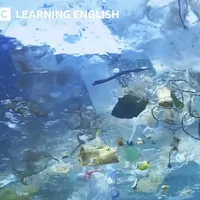Life on Pacific garbage patch: BBC News Review | by 700 Eth | Apr, 2023 | Medium
Plastic in the ocean. Could it actually be helping some creatures? This is News Review from BBC Learning English. I'm Neil. And I'm Sian. Make sure you watch to the end to learn vocabulary about this story. Don't forget to subscribe to our channel, like this video, and try the quiz on our website. Now, the story.
The Great Pacific Garbage Patch. It doesn't sound like a great place to live. But scientists have discovered coastal creatures making the huge plastic waste island their new home. Researchers say these creatures will now reproduce in larger numbers than before because of the extra space created by the rubbish.
You've been looking at the headlines, Sian. What's the vocabulary? OK, we have ‘piggybacks', ‘hitched a ride', and ‘love shack'. This is News Review from BBC Learning English. Let's look at our first headline. This is from The Hindu: So, this headline is saying that coastal life — that's creatures that normally live on the coast — are piggybacking on this island of junk, trash, rubbish, garbage, waste into the middle of the ocean.
We are looking at the word ‘piggyback', and there are familiar parts there: ‘pig' and ‘back'. But what's the connection? OK, well, there's no actual connection to pigs. So, piggyback is a way of carrying someone on your back like this. So, their legs are here, and their arms go round your neck.
So, for example, if my daughter is tired, I give her a piggyback. So, it can be a verb or a noun. Yes. And the headline is talking about these creatures that have used this plastic island as if it was a piggyback to travel. There is another, even less literal use and meaning of piggyback. Can you tell us? Yeah.
We can also use piggyback to describe when someone or something uses the success of something else for their own benefit. So, imagine there's a festival in your town. Some businesses will sell stuff connected to the festival. So that they piggyback on its success. OK. Let's look at that again. Let's have our next headline. This is from The Print: So, again, this headline is about these coastal creatures travelling on a junk island in the ocean.
We're looking at ‘hitched a ride'. Notice in the headline it was just ‘hitched ride', but the expression is ‘hitched a ride'. Headlines often leave out the ‘a'. Yeah. So, you might know the word ‘hitch' from ‘hitchhike'. If you ‘hitchhike', you stand on the side of the road with your thumb up, and you ask to travel in a stranger's car or van for free.
So, ‘hitch a ride' is similar, but you could also use ‘hitch a ride' if you travel with a friend for free. Yes. And so these creatures, these coastal creatures, are using this junk island as a vehicle. It's not their vehicle, but it's as if they are hitching a ride on it. Now, ‘hitch a ride' is a pretty informal expression.
Yeah. So, it is much more likely to be used with friends or family. So, this morning, I didn't catch the train to work. I hitched a ride with a friend. So, be careful. We don't use this in academic writing. OK, let's look at that again. Let's have a look at our next headline. This is from IFL Science.
So, this headline describes this great big floating junk patch as a ‘love shack'. Well, we all know what ‘love' is. But what's a ‘shack'? And what do they mean together? OK. So, ‘shack' is a very informal word for a place like a kind of cabin. So, a ‘love shack' is a place where people go to be together in a romantic sense. Yes.
And this expression was made popular by a hit song in the late 1980s called ‘Love Shack'. We don't use it that often. So, why is it in this headline? OK. So, it's used here to be humorous — to be funny. So, coastal species are actually reproducing and creating new life on this patch of rubbish.
So, it's quite funny to think of a patch of rubbish being used in this way. OK, let's look at that again. We've had ‘piggyback' — ‘rides on'. ‘Hitched a ride' — ‘travelled in someone else's vehicle'. And ‘love shack' — ‘a place for love and romance'.
So, we know plastic waste is a major problem for our oceans, so, watch this video to learn how to curb your plastic addiction. And click here to make sure that you never miss another one of our videos. Thank you for joining us. Goodbye. Bye.

